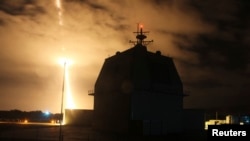The Pentagon says the military conducted an unsuccessful missile defense test over Hawaii on Wednesday.
Pentagon chief spokeswoman Dana White confirmed the test on Thursday.
"It did not meet our objectives, but we learn something all the time from these tests, and we learned something from this one," White said.
The Missile Defense Agency (MDA) said a Standard Missile-3 (SM-3) Block IIA that was launched from a facility in Hawaii attempted to intercept an intermediate-range ballistic missile target during the test.
This was the first test where an SM-3 Block IIA missile was launched from land using the Aegis Ashore testing complex, according to the MDA. The agency is investigating what caused the test to be unsuccessful.
Japan is planning to buy the Aegis Ashore land-based system to boost its own defenses against North Korea, and the missile used in the test is still in development.
The missile defense system tested on Wednesday could be used in the Western Pacific region. However, it would not be the weapon used to protect the continental United States against potential intercontinental ballistic missiles (ICBMs) that North Korea is working to develop.
"The primary system that would be used to protect against a North Korean ICBM against the continental United States would be is the ground-based interceptors, of which they are located in Fort Greely, Alaska, as well down in California," Lt. Gen Kenneth "Frank" McKenzie told reporters Thursday. "That is not the missile that was tested."
The United States did successfully intercept a medium-range ballistic missile from the USS John Paul Jones destroyer off the coast of Hawaii in an August 2017 test.
About a month prior to that success, however, a SM-3 missile test failed after a mistaken input by a sailor on the destroyer caused the missile to self-destruct before reaching the target, according to the MDA.




